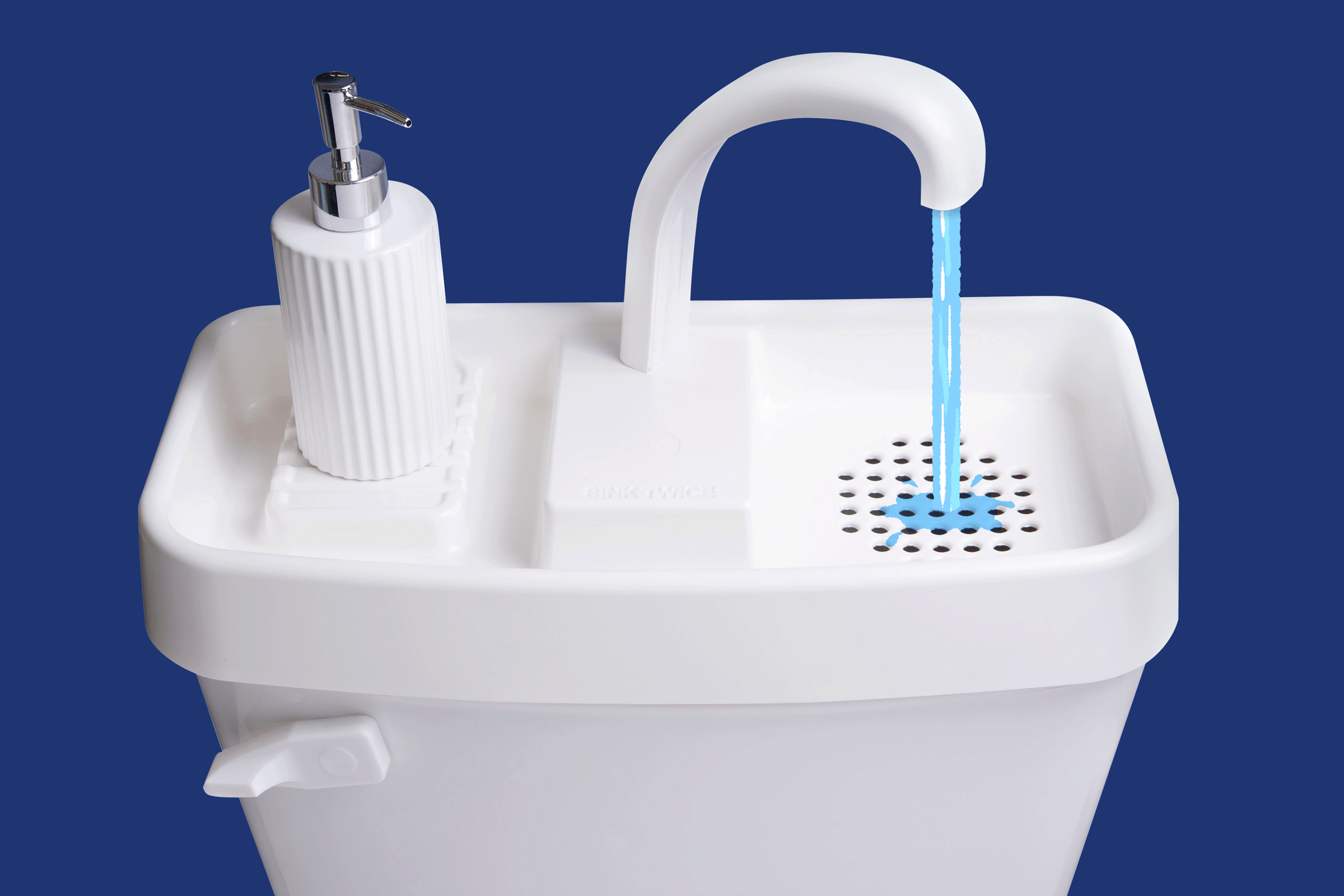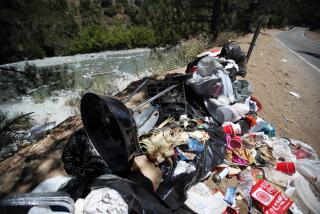How washing my hands with ‘toilet water’ cut my water bills in half

- Share via
It’s hard to be blasé about the Sink Twice. I don’t want to oversell a plastic sink that sits over a toilet tank, but this ingenious, relatively low-cost device could help save the world.
Why? Because it saves water. It saves money. It motivates children and adults to wash their hands. It’s a great conversation starter. And it’s really fun, which by itself makes the Sink Twice worth the $83.99 price tag.
So I’m casting aside any pretense of neutrality here. The truth is, once I installed it in my guest bathroom, I loved it so much that I immediately bought another on Amazon for my other toilet.
I had low expectations when I bought the device to test for The Times’ 2022 gift guide. Based on the photo, it looked like a flimsy plastic device, the kind that works poorly and breaks a few weeks after installation.
But I measured the top of my toilet tank as instructed, ordered the recommended size and waited a few days before it arrived. I wanted to install it immediately, but the instructions confused me. I’d never dealt with the mechanics of a toilet before and was suddenly worried about some terrible outcome. So I called the company’s toll-free number for help.
I expected to get someone overseas reading from a script. Instead, to my astonishment, the man who answered was Sink Twice owner and inventor Culver Van Der Jagt of Louisville, Colo., who spent a good 30 minutes talking me through the installation.
It really wasn’t that hard once I got over my fear of catastrophe. Basically, the sink comes with everything you need except a pair of sharp scissors. You just attach the faucet and a few hoses inside, place the sink over the tank, and voilà, you’re ready to flush and wash.
Van Der Jagt didn’t know I was a reporter. He was patient and apologetic that the instructions weren’t clearer. And his only reward was my excited laughter when I flushed the toilet and, as promised, a stream of water flowed out of the faucet onto my hands.
I flushed a lot that first day and practically dragged the whole neighborhood into my bathroom to check it out. Most people were delighted, but a few recoiled. “Are you washing your hands with toilet water?!” one of my guests sputtered.
Actually no. As Van Der Jagt and Krista Guerrero, a Metropolitan Water District water efficiency specialist, explained, the water that flows into the toilet tank is the exact same water we use to take a shower or wash our hands at the bathroom sink.
“It’s not grey water or wastewater until it goes through the toilet bowl,” Guerrero said. “The stuff going into the tank is just potable water.”
That information kind of blew my mind because I’d always been squeamish about the water in the tank. It looked and smelled perfectly clean, but it always felt nasty by association with the toilet bowl.
Van Der Jagt jolted me past that misconception with a few statistics: When it comes to wasting water, toilets are among the biggest offenders, accounting for about 30% of our overall household water usage.
We use the toilet at least six to eight times a day per person, flushing at least 1.6 gallons of potable water down the drain every time, according to the Alliance to Save Energy, a bipartisan, Washington, D.C.-based coalition advocating for federal energy efficiency policies. And if your toilet was installed before 1994, it’s likely using double that amount of water to flush.
Then, as the toilet is flushing, we walk a few steps to the sink to use another couple quarts of water to wash our hands with the exact same water refilling our toilet tanks.
So if we skip the trip to the bathroom sink and let the water filling the toilet tank do double duty, each person in your household could save at least three gallons of water a day, which is cause for a little celebration, said Guerrero. “We’re proponents of anything that saves water, so we’re happy to see all these innovative devices on the market and happy to see them used in people’s home.”
Once you do the math, it takes us back to saving the world, because that’s really how Van Der Jagt got started. In 2015, he was a divorce attorney in the Boulder, Colo., area helping battered women get out of abusive relationships.
But the work was dangerous, he said, and taking an emotional toll. Even his then-5-year-old daughter, Brooke, knew it, something he learned the day he was teaching her how to ride a bike. Van Der Jagt encouraged her the way parents do, saying, “You can do anything you set your mind to.”
The frustrated 5-year-old snapped back, “Dad, that’s not true. You need to stop saying that, because if it’s true, why are you working a job you don’t like?’”
Brooke had been learning about water shortages with her kindergarten class and was hyper aware of drought. So when a stunned Van Der Jagt asked her what he should be doing instead, she had a ready answer: “Why don’t you save California from running out of water?”
He accepted the challenge by rigging up a sink toilet in their powder room. “It was made from a pie pan, some tape and some cardboard. Honestly, it was horrific looking, but it did save a lot of water,” he said. “And I realized it instantly increased hand-washing in the home. Both my kids loved it. I think it was the only faucet in the house that my 3-year-old, Preston, could reach all by himself.”
A year and several improvements later, Van Der Jagt began selling his sinks on Facebook. He expected a few friends to sign up out of solidarity. Instead, he got a huge response from customers in Mexico who rely on water tanks to keep water flowing in their homes. The Sink Twice helped extend the water in their tanks by at least another day, he said.
I can believe it. Since I installed the Sink Twice in early September, my water bills have been nearly half what I paid in 2021.
Pro tip: Follow Van Der Jagt’s instructions to use nonscented foaming soap only — otherwise, you’ll have suds floating in your toilet tank and fruity flavors seem to encourage mold. I used leftover lemon-scented soap in one bathroom, and after a couple of months, I discovered mold growing on my plastic tubing (just wipe it down with bleach, Van Der Jagt advises). No such problem in the other bathroom, where I used the only scented foam soap he recommends: Method’s Sea Minerals hand soap.
So if you’re looking for a unique holiday gift under $100, this is just the ticket. Because, honestly, folks, how often can you save the world and have a lot of fun at the same time?
More to Read
Sign up for The Wild
We’ll help you find the best places to hike, bike and run, as well as the perfect silent spots for meditation and yoga.
You may occasionally receive promotional content from the Los Angeles Times.











